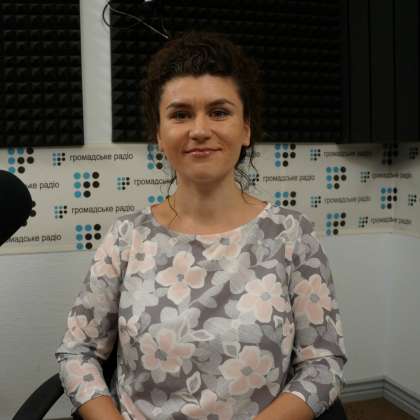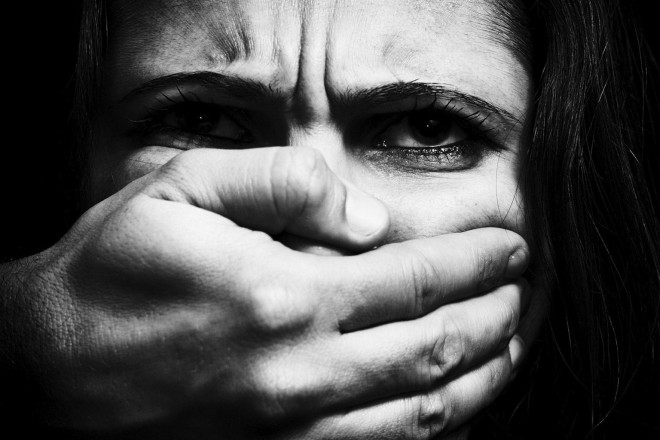
Marta Havryshko, Candidate of History, Junior Researcher at the Krypyakevych Institute of Ukrainian Studies. Studies the history of women and gender issues in the historical context of the Organization of Ukrainian Nationalists (OUN) and the Ukrainian Insurgent Army (UPA) in the 1940-1950s and their resistance to Soviet authority. Her sphere of interests: gender aspects in OUN and UPA, nationalism and feminism, gender-based violence, everyday life in history, oral history, and sexual violence during the Second World War.
Ms. Havryshko recently presented a report on “Violence in the ATO Zone”, in particular “Violence against Women”.
Iryna Slavinska: Is there gender-based violence in the ATO zone?
Marta Havryshko: It’s very difficult to study and properly investigate this subject. When we started our research project, it concerned a wide range of roles that women have played in the war in Eastern Ukraine. I refer specifically to women soldiers and volunteers, internally displaced women, women who deliver assistance, nurses and medics, women who transport prisoners and the wounded…
Last and this summer, we recorded 38 interviews with various women of different ages representing different regions of Ukraine. One of the problems that we tried to investigate more thoroughly was the question of gender-based violence.
Iryna Slavinska: Do women speak openly about sexual abuse and violence?
Marta Havryshko: No, women usually keep silent. We’re trying to create a safe space for them, that is, we don’t record the interviews directly in the ATO zone where their units are deployed as in most cases, women are sexually abused by different-level commanders, as well as their colleagues… both men and women.

When we talk about violence, there’s often a third party involved. One woman told me about the time she had to sleep in the dugout… a drunken soldier came to her near midnight, and tried to force her. She managed to push him out of the dugout, but three hours later he returned, grabbed her leg with one hand, closed her mouth with the other and tried to rape her. She managed to get loose, and got help from the guys who were nearby.
But, I’d like to point out that other soldiers will help only if the offender doesn’t occupy a high position, that is, the men are afraid to act against or accuse their superior officers.
I can cite very many cases… For example, we have the story of a woman who managed to escape from the clutches of the commanding officer, but the girls who had already been abused by the same man decided to take revenge on her, so they beat her so terribly that she lost the child she was carrying. Moreover, the woman who reported this incident and provided that poor woman with medical assistance was punished by her commanding officer… she was deployed for a month to the front lines without food. She told us that it’s very difficult to resist this kind of violence because it’s taboo and no one wants to talk about it.
In addition, during war, human rights and personal integrity play a minor role in comparison with feelings of solidarity, brotherhood and everyday human losses. This taboo carries negative and compromising information about their “brothers”, so women often refuse to report it. Moreover, women who want to pursue a military career understand that such a report may endanger promotion and their future in the army.
Viktoriya Yermolayeva: Have you seen any official reports?
Marta Havryshko: Yes, I saw a report about a woman who was violently raped. It should be noted that this woman has been under a lot of pressure. Many people knew about this matter, because she immediately submitted a report so it was impossible to conceal this matter, despite the fact that the rapist tried hard to hide the facts. After raping and abusing her, he simply washed her body so that there would be no trace. But, he beat her a lot, and the stark bruises on her face testified to the fact that she had resisted. She filed a claim; she was supported by a close male friend, who was then beaten by some strangers, and she was forced to suspend her claim. That case became public and hit mainstream media; several deputies knew about it. But, a year has gone by, and nothing’s happened. The guilty party hasn’t been punished… as a matter of fact, the case hasn’t even been filed yet.
Of course, gender-based violence is committed by both warring sides and we have reports confirming such facts from people residing in border villages and along the contact line. The victims are afraid of publicity, so all our interviews are done in secret.

It’s very important that such women get psychological assistance, which is sorely lacking in our country. This woman can’t sleep, takes antidepressants that won’t help her at all, she thinks going to see a psychologist is completely useless, her husband left her and she’s in the middle of a divorce. So, I firmly believe that such things should be discussed more openly. We need to talk more…
After all, the women who are in the war zone are highly motivated, so, in addition to crazy official obstacles, insurmountable bureaucracy and gender discrimination, why should they have to face other forms of violence?
- Oleksandr Matviychuk, Chairman of the Center for Civil Liberties:
“Sexual violence is a forgotten issue in the Donbas war. People who are released from captivity refuse to think about their experiences, never mind talk about them. Victims and witnesses of sexual violence do not believe that justice will be done… even in the near future. This is also due to the fact that in Ukraine rule of law does not govern everyday life. It is the third year of war, but neither legislation nor judicial practices have been adapted to actual conditions for investigating crimes committed in the course of an armed conflict.”
See Report by Eastern-Ukrainian Center for Civic Initiatives – Unspoken Pain, Gender-Based Violence in the Conflict Zone of Eastern Ukraine (Warsaw 2017) – presented at the round table entitled “Sexual violence and impunity in the armed conflict in the Donbas: taboo on justice” organized by Правозахисний порядок денний (Human Rights Agenda) under the auspices of the Justice for Peace Coalition in Donbas and in partnership with ZERO IMPUNITY.
- For additional information see: Report of the Office of the United, Nations, High Commissioner for Human Rights , Conflict-Related Sexual Violence in Ukraine (14 March 2014 to 31 January 2017)
- Ukraine has a Gender Inequality Index (GII) value of 0.284, ranking it 55th out of 159 countries in the 2015 index. In Ukraine, 12.1 percent of parliamentary seats are held by women, and 94.3 percent of adult women have reached at least a secondary level of education compared to 96.0 percent of their male counterparts. For every 100,000 live births, 24 women die from pregnancy related causes; and the adolescent birth rate is 24.1 births per 1,000 women of ages 15-19. Female participation in the labour market is 52.2 percent compared to 67.4 for men.








